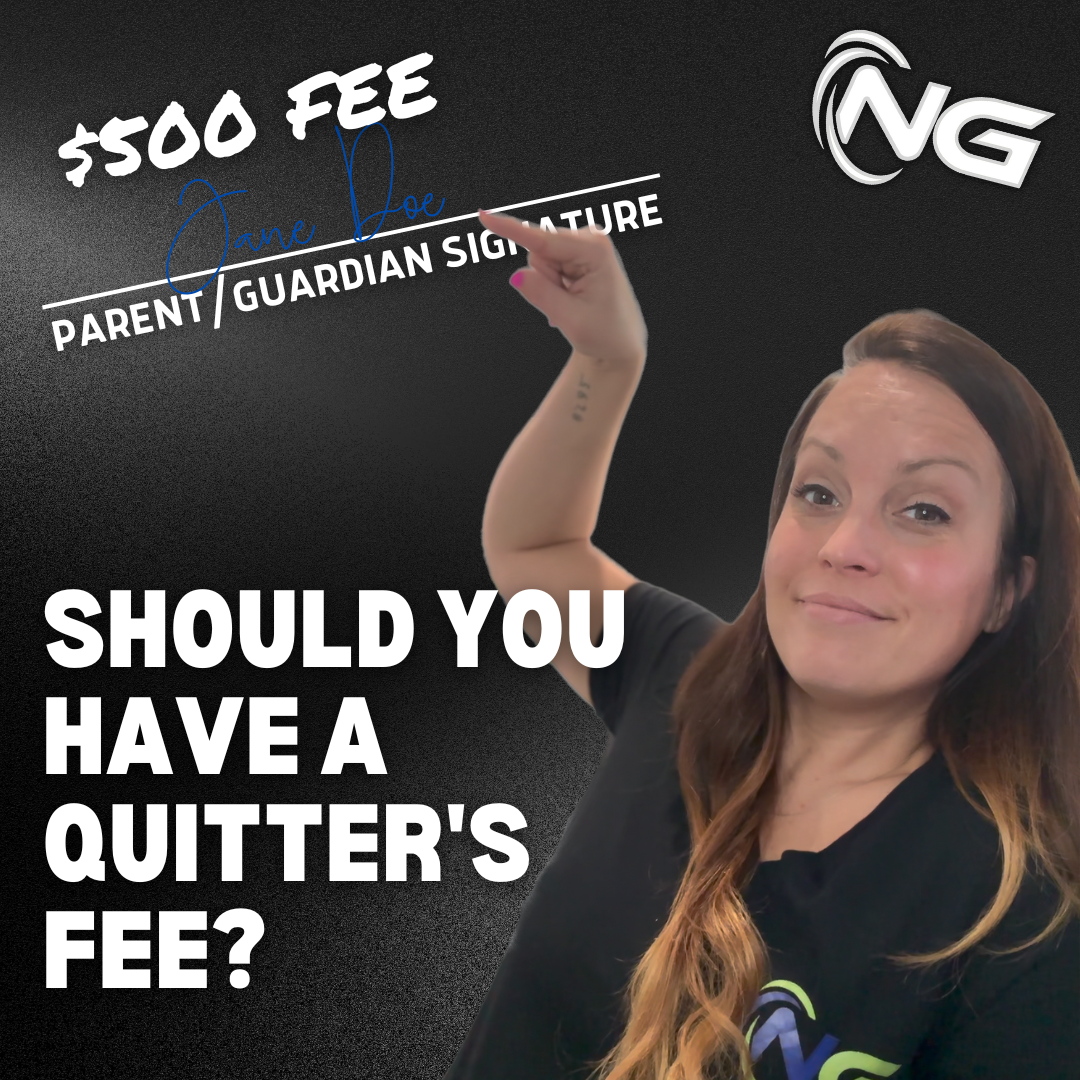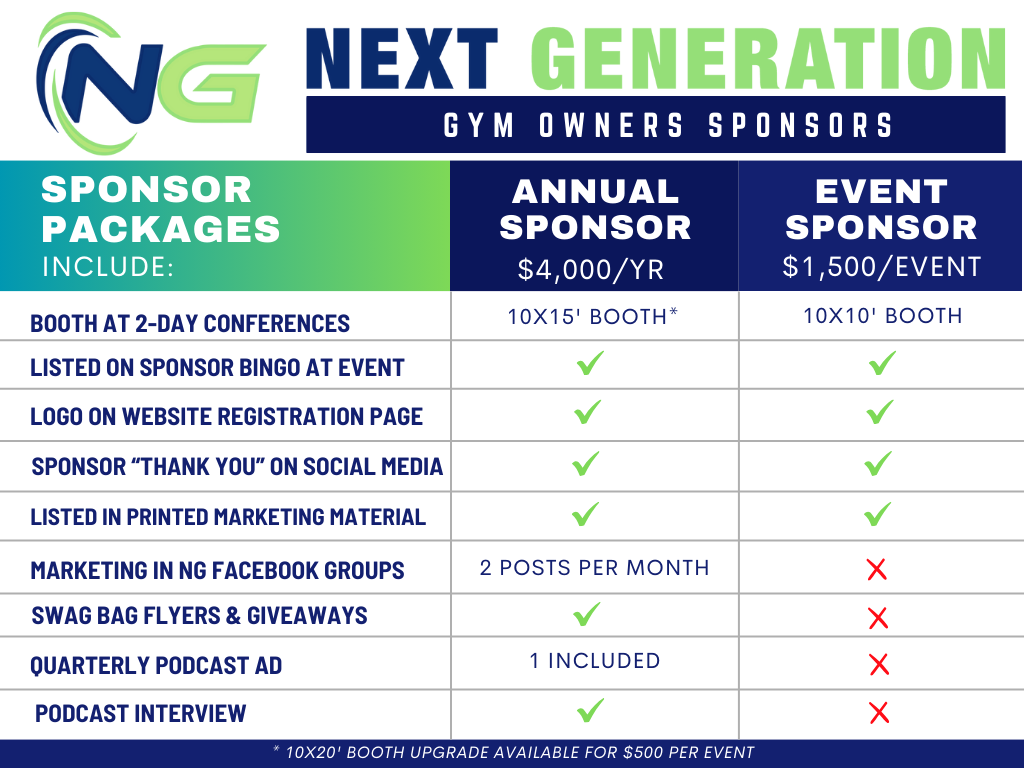My daughter used to do competitive swim. The program in our area is very successful and pretty serious about swim. In fact, if you see the older kids, their physique alone shows how serious they take the sport. Their muscles are lean and defined. They have that v-shape everyone is always trying to get, and they are serious about their sport.
My daughter made it on the team because while she was a decent swimmer, the coach knows my gym. He knows my athletes are in shape, and my daughter – at 10 years old – is clearly conditioned well and in shape.
When we joined the swim team, I had to meet with the coach and complete a registration. There was a team agreement I had to sign stating the practice and competition policy. After all, they’d be relying on her to be at all the meets to contribute to the team placement.
Do you know what I didn’t have to do though? I didn’t have to read a 12-page packet and sign a contract that threatened me to pay $500 if she quit the team. Though I own a gym and we would never quit a sport mid-season, I can tell you one thing. There is no way I would have signed a contract like that, and I don’t expect my gym parents to either.
A few days ago I talked about the fees some gyms assess to athletes for being late or absent from practice. We talked about how the fees should really correlate to the problem. “Charging the card on file” against our gym parents’ wishes is not the kind of program I want to run, and you shouldn’t either.
I used to have a quitters fee too though. In my early days of owning a gym, not only did I take advice off the internet (because if it’s posted on the internet it must be true), but I also did things that benefitted me and my gym only. If it was in the best interest of the gym it was the policy – even if it meant you as the parent were screwed in the process. I didn’t run things that way because that’s who I am as a person. I ran them that way because that’s the way everyone did it. If it worked at your gym and prevented kids from quitting mid-season, well then it would work for me too. Right?
Wrong.
In fact, it created a huge headache for me.
- Parents whose children had expressed interest in the program saw that fee and thought one thing, and one even had the guts to say it once. “Wow, you must have a lot of kids quit if you need a fee to keep them from doing it.” In reality, I didn’t have a ton of kids quit, but I assumed a deterrent like that would solidify their spot on the team.
- I was wrong. People who wanted to quit did it anyway. Some would cancel their cards before they put in notice of quitting, and others would dispute the charges. My systems back then weren’t all that great, so when someone disputed a charge, sometimes I wouldn’t even learn about it until after the person had won the case.
- It always turned into a fight. No great parent who read the packet and truly adhered to the policies was quitting mid-season. It was usually people we had a problem with. So you can imagine how many people would leave on bad terms when they realized they’d have to pay a fee to leave.
- Anyone who had a job that occasionally moved them or was in the military wasn’t signing that contract. Though I had a clause for military, it wasn’t worth it to them to have to produce PCS orders just to avoid a fee. To the few who did do it, I truly felt stupid. I knew they had orders. They announced it on Facebook, packed up their houses and usually invited the team for going-away parties. But because it was “gym policy”, they had to show me their orders to not get the fee. How stupid!
There’s no doubt it’s inconvenient to have kids quit in the middle of the season. It’s even more inconvenient to deal with problems for months because you have kids or parents on the team who should have quit a long time ago. When someone tries the sport and realizes it’s not for them, the last thing you want is an athlete who complains, is always late and rarely puts in the same amount of effort as the rest of the team.
On top of all that, consider when someone has to legitimately be released from the gym. This happens every few seasons in my gym. The #1 way to get released from my gym is to tell your kid to drop a flyer on purpose. You’d think a parent would never do this, but over the years, we’ve released three families for this. It is pretty hard to leave on good terms when you’re having to tell a parent their actions were dangerous. Add a mandatory fee on top of that, and you’re basically guaranteeing that you’ll be rated 1-star across the internet and bad-mouthed in public for years. Parents who are irrational, aren’t going to be any more rational when you charge them a quitters’ fee. After all, they didn’t quit. You released them. I supposed I’ve never asked my attorney, but I’d also question how legal it is to deny someone services and then turn around and charge their card for “quitting”.
So how do we avoid kids quitting in the first place, because that’s really the root of the problem. When you have very few kids quitting things, you end up having very little reason to have a quitters fee in your contract. I have 165 kids this season. I had a novice kid and a prep kid quit last summer. One said she was moving and went to the other gym. The other said she thought she’d like cheer because sister loves it, but it turns out soccer was her sport.
Here’s what that looks like when I see the first around town (because we’re in a super small town and eventually you’ll run into everyone at Walmart.)
- I politely say hello and ask how they’re doing. I have given up grudges about that stuff over the years. Maybe her coach at my gym wasn’t a good fit. Maybe her team was too big and she needed more one-on-one attention. She wasn’t a flyer at my gym, and now she is. Maybe that’s what was most important to her. All of that is OK with me. I’m not holding anything against anyone, and we’d welcome them back in the future if they changed their mind. At the end of the day, it’s important to see if the grass is really greener. Did she lie? Yes. Probably. Maybe their move got canceled. Probably not. It’s not my job to judge that. She left my gym on good terms, and we’re good enough coaches to make it work and make sure the team was relatively unaffected. If I had charged that parent a quitters’ fee, I guarantee she’d never consider my gym again. The other gym in town does have a relatively large quitters fee. What’s to say she doesn’t have intentions to return to my gym next season and is just trying to finish out the season without being charged a huge fee? After all, quitters fees don’t keep people from quitting at the end of the season.
- The second one – well, her sister still cheers. When I heard, I did call mom and ask if they were certain. I wanted to make sure sister wouldn’t change her mind as the showcase and first competition rolled around. Mom was certain, and so I suggested they stay in tumbling in case she changed her mind for future seasons. No relationship harmed. I bet if I charged her $500 for her 6-year-old to quit the team, it wouldn’t have ended that way.
The best thing you can do is create a positive gym culture so people don’t want to quit in the first place. Here is how we do that:
- Our practices are open to the rest of the gym. That means rec parents can see our practices happening. Nothing is a secret. They can watch my tinies practice and decide if their child is ready for something like that.
- I have a very informative cheer packet that I also go through via video and an in-person meeting each year. I literally give three ways for you to learn about our various programs, the commitment levels, financial breakdown, etc. You know exactly what you’re going to get.
- I point out our veteran parents at those meetings and ask people to reach out to them for their testimony and experiences as well. I trust those parents who return season after season are fans of our program. They also might be able to build a relationship with new parents that acts as a mentor for them.
- We over-communicate with parents. If you’re afraid someone will get mad that you’re posting in their team Band, emailing and announcing it at practice – remind them that not all parents are as keen to communication as they are. I once had to tell a parent that I will always overcommunicate so people know what’s happening. When other parents aren’t informed, the whole team suffers.
- We offer mid-season evaluations so we can get a feel for where kids are, how they’re feeling and if they or their parents have any questions.
- I never avoid confrontation. If it feels weird – address it. Maybe you’re overthinking it…but probably not. If a parent is short with you time and time again, it’s probably worth asking if they’re doing OK or if they need to chat with you about anything. This can be incredibly awkward, but if you can build a culture where you truly care, you’ll often find that parents feel more comfortable telling you the things you probably need to know. Usually I know about an issue before a parent even approaches because others want to maintain the positive gym culture and hint that I should reach out to so-and-so. I’m never too busy to do this. The culture in your gym will directly impact retention.
So instead of keeping people “in” by assessing a large fee if they quit, create a culture where they never want to quit. Show your families you care, and you’re willing to go the extra mile to hear them out and answer their questions.
I once paid a large fee to get out of a cell phone contract. My service sucked. I was barely able to make calls in my house let alone around town. I was unhappy and frustrated. Paying the fee didn’t make me any less frustrated. It also made me tell others who were looking for a new cell service to avoid that company altogether. It opened the door for me to tell them all the reasons I’d never go with that company again.
Don’t give your families (or former gym families) a reason to talk like that about your gym.











